The Madwoman Upstairs by Catherine Lowell follows the last remaining Brontë, Samantha Whipple, as she begins her education at Oxford. Samantha has inherited her late father's obsession with the Brontës and is determined to understand what it is her father wanted her to learn from them. She is also fighting the rest of the world's fascination with the missing Brontë fortune and the assumption that Samantha herself is hiding it, depriving the world of secret diaries and paintings by the Brontë sisters. Samantha attempts for a few years to fulfill her familial destiny and become a writer herself. She is sadly disappointed in her efforts:
And yet I couldn't produce anything of value. Now that I could say anything I wanted, I had nothing to contribute I was unable to take advantage of the intellectual emancipation for which my own ancestors had struggled so fearlessly I had taken the freedom Virginia Woolf and Charlotte Brontë and Mary Wollstonecraft had sent me, and thrown it right back at them.
For that, I knew I would never be forgiven.
I learned so much about the Brontë family from this book that I never knew. For instance, this tidbit:
...Charlotte was the eldest, the most famous, and the ringleader of the family. Four foot eleven. Strong, opinionated, admirable. The entrepreneur. A real nineteenth- century ballbuster. Jane Eyre was her brainchild. Mr. Martin didn't bother mentioning that it was the sort of novel you adored as a child and then misunderstood for the rest of your life.
This last comment really hit home with me, as does this statement from Samantha's professor at Oxford:
"I will wager a guess and assume that, like most women your age, this was your favorite novel growing up."
Oh, was Jane Eyre my favorite novel! And I thought it made me so original! All the other girls I knew thought Pride and Prejudice was the best on offer from classic literature, which I considered highly overrated. Instead, I latched on to the dark and mysterious Jane Eyre with the brooding love interest and tortured heroine. Still, it wasn't so dark as Wuthering Heights, which I thought was just miserable. Oh, I thought I was so clever to recognize the best of the classical novels presented in high school English class, but according to Professor Orville, I was just another cliché.
I have always thought that certain books have season of their own. Some are beach reads, some are for fall. I would classify this as a Winter book. Set in cold, rainy Oxford and with such a dark take on some of literature's most revered women writers, I think it is probably best suited to January, the most melancholy of months in my opinion. (My, see how my writing so quickly assumes that of the book I've most recently read. Or attempts to, at any rate.)
For the first half to two-thirds of this book, I really enjoyed the main character. She's smart and snide and sarcastic and she doesn't play into anyone's expectations of her. By the end, however, I had lost interest in her. There are twists and turns, and while they are surprising, none are enough to make this book what I had expected it would be as I read the first half. I liked it, but I didn't love it. If you are a huge Brontë fan, this book might hold more interest for you, but be prepared to have some of your images of those famous writers shaken.



